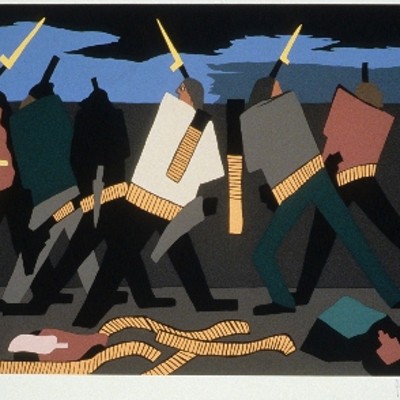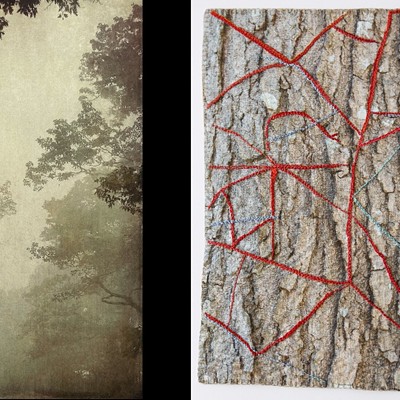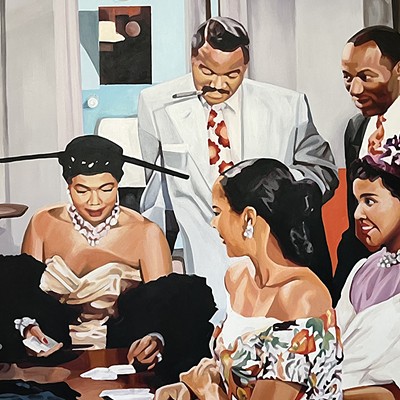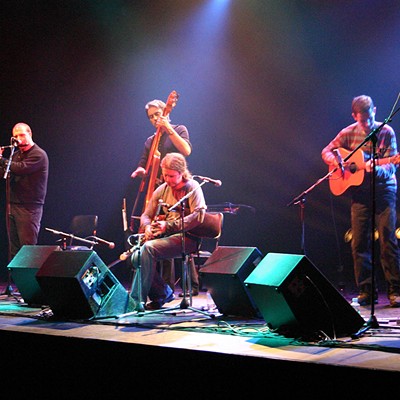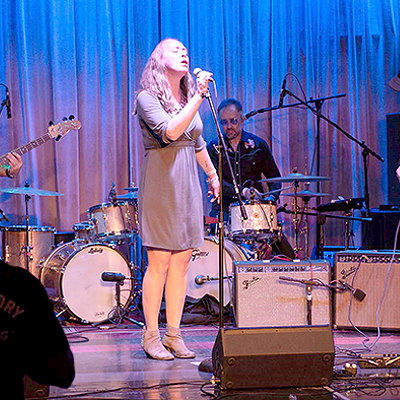"The show is a collaboration with the New Orleans Dirty Dozen Brass Band," associate artistic director Debbie Blunden-Diggs said by telephone from Dayton last week. "It has the live element of music. It's a fun show, energy-packed from beginning to end--not your normal spend-the-evening-at-a-dance-concert evening."
The evening-length work, When the Spirit Moves, will get one performance only, on Saturday night at Centennial Hall. A compilation of shorter pieces already in the DCDC rep, Spirit has been loosely strung together into a narrative by company artistic director Kevin Ward. The stories evoke moments in African-American history, from the passage of slaves across the sea to the incubation of jazz in New Orleans. Providing a live musical tapestry throughout, the Dirty Dozen Brass Band mixes traditional 19th-century New Orleans horn music with contemporary bebop, funk, rhythm and blues and pop.
The spicy marriage between dance and brass has brought in new audiences, Blunden-Diggs said. "Around the country, people who don't know about dance come in to see the Dirty Dozen, and people who don't know about the music come in to see us. It's a wonderful evening."
DCDC and the Dirty Dozen first collaborated in 1999, on "Children of the Passage," a 25-minute work for 11 dancers choreographed by modern master Donald McKayle and the newly acclaimed Ronald K. Brown. That piece, now part of Spirit, "deals with our ancestors' past in an abstract way," Blunden-Diggs explained. "They paved the way for us. We need to shed the layers and get back to where we were."
The chemistry between the musicians and dancers was so "wonderful we wanted to expand on that opportunity." The result was When the Spirit Moves, which premiered in 2001, a "visual chronicle of the African influence on American modern dance, jazz and the blues."
The Dayton troupe was founded in 1968, by Blunden-Diggs' mother, Jeraldyne Blunden (she died in 1999). Now known as one of the best of the independent black companies operating around the country (others include Cleo Parker Robinson of Denver and Philadanco in Philadelphia), DCDC traces its origins back to the segregated Dayton of the 1940s. A group of black women, including Jeraldyne Blunden's mother, went to Josephine and Hermene Schwarz, founders of the Dayton Ballet, and asked for lessons for their daughters.
"Miss Josephine and Miss Hermene couldn't risk bringing in African-American students to their school," Blunden-Diggs said, "but they offered to do the classes" at a black neighborhood center. Young Jeraldyne signed right up. "My mother visualized a dream. They saw that in her."
The Schwarzes helped the young dancer get scholarships to the American Dance Festival and Jacob's Pillow, where she trained with Martha Graham, José Limón, George Balanchine and James Truitte. When she was 19, they appointed her director of the school. Her students went on to dance around the country, but eventually, her daughter said, "Her dream got bigger. She thought, 'Why can't I establish my own company?'"
She did just that, right in her hometown.
"It was a big thing. People thought good dance couldn't be seen outside New York. We travel quite a bit, but we usually do two to three cities, within about 10 days, then go home. Dayton is our home base. That's where we have our creative time, our studio time."
The company's dance style is still based on "an eclectic mix of everything my mother learned. Our dancers train in ballet, modern and jazz, and our choreography finds itself in the mix."
Blunden's distinctive choreography went on to win her the MacArthur "genius" award and the Dance Magazine Award, and the troupe has performed to acclaim all over the world, from Canada to Korea. Anna Kisselgoff of the New York Times has praised the DCDC's "virtuoso dancing ... (and) a signature style rooted not so much in power as in speed, suppleness and intricacy."
In 1988, the American Dance Festival asked the company to participate in its Black Tradition in American Modern Dance project, to reconstruct classic works in danger of being lost. One of these, "Awassa Astrige/Ostrich," will be seen in Saturday's show. Choreographed in 1932 by Asadata Dafora of the Ivory Coast, it was re-staged by the DCDC in 1997. It's a solo, a "modern dance classic" that portrays "this largest of birds as regal, if not a little sinister."
"From Congo Square," another Spirit work, re-creates the marketplace in New Orleans, where from the 18th century on, slaves gathered on Sundays, playing music and dancing by the hundreds. Scholars credit Congo Square with being an incubator of jazz.
The black church is another jazz cradle, Blunden-Diggs said. Her piece "In My Father's House," from 1997, conjures up a foot-stomping Baptist church service, set to contemporary gospel tunes by Kirk Franklin and the Family. One of the tunes, "When I Think About Jesus," invariably brings the audience to its feet.
"This is the only segment without live music," reported Blunden-Diggs, who has been with the company since the age of 12, first as a dancer, then as a choreographer and associate artistic director. The companion piece to "In My Father's House" features live music by the Dirty Dozen without dance. If churchgoers were singing gospel upstairs on Sunday mornings, Blunden-Diggs said, on Saturday nights, musicians were jamming down in the basement.
When the Spirit Moves also has room for "Praises," a "ring shout" from a "New Orleans-style funeral. It's more of a celebration than not."
The evening, a little more than two hours with intermission, comes to a close with "Second Line."
"It happened during parades in New Orleans," Blunden-Diggs said. "People get up and dance and interact."
That's what generally happens at the DCDC Dirty Dozen Brass Band concerts too. "Everybody's playing and dancing. It's a winner."

